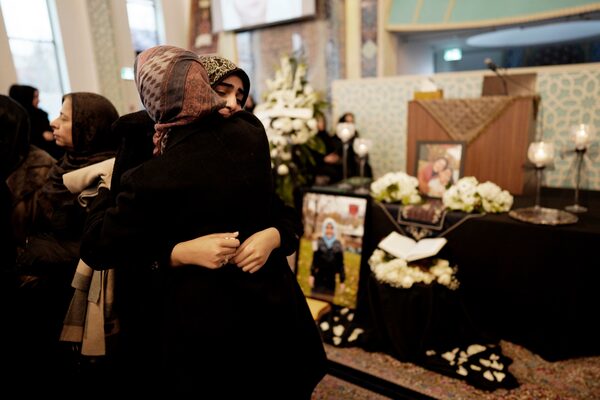Good morning,
These are the top stories:
Protesters have taken to Iran’s streets over the downing of Flight 752

Students in Tehran demonstrate following a tribute for the victims of the crash. (Atta Kenare/AFP via Getty Images)ATTA KENARE/AFP/Getty Images
Chants of “death to the liars” and “death to the leader” – Ayatollah Ali Khamenei – rang out in weekend protests, with Iranian forces reportedly shutting off internet access and firing live ammunition and tear gas to quell dissent. The growing public outrage follows Iran’s acknowledgement that its military was responsible for the downing of a Ukraine International Airlines (UIA) jet with 176 aboard.
Criticism is also building against an aviation organization and Ukraine’s government
The head of Ukraine’s probe into the 2014 downing of Malaysia Airlines Flight 17 by a missile says an investigation into the Iran crash should examine why commercial airliners were still flying into and out of Tehran.
Vasil Vovk said his team found that airlines rely heavily on safety advice provided to them by the Montreal-based International Civil Aviation Organization, or ICAO.
“This organization should be held responsible,” he said. “If ICAO had told us to close our airspace [over eastern Ukraine in 2014], we would have done so immediately. If this international organization had recommended to stop flying over Iranian territory [last week], UIA would never have sent a flight there.”
In Ukraine, many are struggling to believe Iran’s latest version of events, which attributes the downing to a mistake. Citizens are questioning why the flight wasn’t cancelled, given Iran was firing missiles at U.S. bases in Iraq hours earlier. Some have criticized Ukrainian President Volodymyr Zelensky as being too slow to side with Western allies, including Canada, in saying that the plane was shot down by a missile.
As Canadians mourn, federal officials head to Tehran
A full team of consular staff will be in place by tomorrow as Canada looks to support the families of the crash victims. Experts with the Transportation Safety Board will also be on the ground visiting the crash site, with a second team ready to be deployed to analyze flight recorder data.
Thousands of Edmontonians filled a University of Alberta sports centre yesterday to remember those from the university community killed in the crash.

(Todd Korol/The Canadian Press)Todd Korol/The Canadian Press
On display were photos of the victims, including: a young couple camping in The Rockies; sisters laughing at the West Edmonton Mall; and friends embracing in front of Lake Louise.
Calling the crash a “Canadian tragedy,” Prime Minister Justin Trudeau told those in attendance: “We will not rest until there are answers. We will not rest until there is justice and accountability.”
From Vancouver to Toronto, tearful mourners gathered:
A vigil outside the Vancouver Art Gallery on Sunday. (Taehoon Kim/The Globe and Mail)Taehoon Kim/The Globe and Mail

Mourners gather at the Imam Mahdi Islamic Centre in Toronto. (Geoff Robins/AFP/Getty Images)GEOFF ROBINS/AFP/Getty Images
The Globe continues to compile details about the lives of those lost in the crash. Go here to read their stories.
This is the daily Morning Update newsletter. If you’re reading this on the web, or it was forwarded to you from someone else, you can sign up for Morning Update and more than 20 more Globe newsletters on our newsletter signup page.
The U.S. Defence Secretary has contradicted Trump’s explanation for the Soleimani killing
Despite U.S. President Donald Trump’s public claims, U.S. Secretary of Defense Mark Esper said he “didn’t see” any intelligence showing Iran’s top general planned to blow up four American embassies.
“The President didn’t say there was a tangible – he didn’t cite a specific piece of evidence,” Esper said.
Trump said last week that Qassem Soleimani was planning to “blow up” the U.S. embassy in Baghdad. He later said Soleimani was looking to target four embassies.
The Queen has summoned senior Royal Family members to a meeting over Harry and Meghan
The Queen, Prince Charles, Prince William and Prince Harry are expected to convene as the Royal Family seeks to respond to the growing crisis over the couple’s future roles. Meghan, the Duchess of Sussex, will phone from Canada, where she’s been staying with their son.
Among the issues that must be addressed are titles, finances, duties, security and living arrangements.
Several media reports have indicated that the Queen is devastated by the crisis, which comes just weeks after Prince Andrew was forced to step back from duties over his ties to deceased pedophile Jeffrey Epstein.
Got a news tip that you’d like us to look into? E-mail us at tips@globeandmail.com Need to share documents securely? Reach out via SecureDrop
ALSO ON OUR RADAR
Ottawa launching public consultations on assisted-dying law: The federal government plans to table legislation this spring to loosen some of the rules governing the practice. Last September, a Quebec court ruling struck down a portion of the law that limited access to terminally-ill patients.
Ontario investigating accidental emergency alert: A training-exercise mistake saw millions of Ontarians receive an alert yesterday about an incident at a nuclear facility in Pickering, east of Toronto. Another alert was issued two hours later clarifying that there was no incident.
Flu strain affecting children circulating widely in Canada: Influenza B, a virus linked to a higher risk of hospitalizations and deaths among children, is being detected at about the same rate as influenza A. Experts say this is unusually early in the flu season for influenza B to be appearing to this degree.
MORNING MARKETS
Global stocks perch near record highs ahead of U.S.-China trade deal: World stock markets ticked higher on Monday, hovering just below record levels ahead of the expected signing of a Phase 1 China-U.S. trade deal, although markets have yet to see details of the agreement. Tokyo’s Nikkei was closed, but Hong Kong’s Hang Seng gained 1.1 per cent, and the Shanghai Composite 0.8 per cent. In Europe, London’s FTSE 100, Germany’s DAX and the Paris CAC 40 were up by between 0.1 and 0.6 per cent by about 5 a.m. ET. New York futures were up. The Canadian dollar was trading around 76.57 US cents.
Looking for investing ideas? Check out The Globe’s weekly digest of the latest insights and analysis from the pros, stock tips, portfolio strategies and what investors need to know for the week ahead. This week’s edition includes the best and worst rated TSX stocks, an underperforming bank pick and a simple - and winning - portfolio strategy.
WHAT EVERYONE’S TALKING ABOUT
In the climate change wars, Greta Thunberg thrashes Roger Federer 6-0, 6-0
Cathal Kelly: “Over the weekend, Roger Federer was forced to try something new – defend his integrity. He didn’t do a very good job of it. Federer may be the world’s most successfully branded person. Among his portfolio of sponsors is the Swiss financial giant, Credit Suisse. Credit Suisse invests in all sorts of things, including oil and gas exploration.”
TODAY’S EDITORIAL CARTOON

(David Parkins/The Globe and Mail)David Parkins/The Globe and Mail
LIVING BETTER
Winter books preview: 36 reads to get you through till spring
A mix of returning big names and highly anticipated debuts make up the bulk of this season’s new fiction and poetry, while non-fiction leans toward some of the big questions we’ll be facing in the decade ahead. Becky Toyne previews what’s coming this season.
MOMENT IN TIME
For more than 100 years, photographers have preserved an extraordinary collection of 20th-century news photography for The Globe and Mail. Every Monday, The Globe features one of these images. This month, we’re marking the 100th anniversary of the start of Prohibition in the United States.
Prohibition raids

(Bettmann/Getty Images)
Prohibition devastated the U.S. alcohol industry, forcing countless brewers, distillers and wineries into bankruptcy or drastically altering their products and business models. Still, Americans are an entrepreneurial people. Bootleggers and smugglers quickly moved in to supply the black market – at one point, New York alone boasted an estimated 30,000 speakeasies. But the Volstead Act, the federal legislation that complemented the 18th Amendment, empowered authorities to crack down on these illegal activities. The photo above, taken more than three years after Prohibition took effect in January, 1920, shows Internal Revenue Service agents with alcohol recovered from a speakeasy in Washington. The exploits of Prohibition Unit agents such as Izzy Einstein and Moe Smith became the stuff of popular legend. Einstein had a knack for talking his way into underground clubs, and the two often used disguises – in at least one instance, dressing as husband and wife – to make almost 5,000 arrests in five years. – Massimo Commanducci
If you’d like to receive this newsletter by e-mail every weekday morning, go here to sign up. If you have any feedback, send us a note.